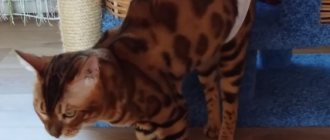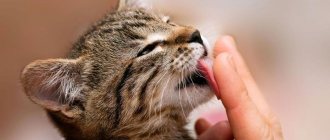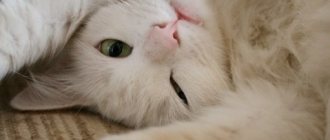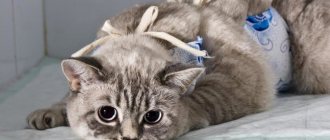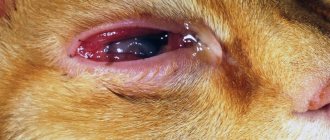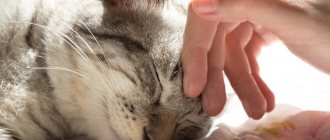6649Administration
The domestic cat differs from the wild one in having a more docile character. He easily makes contact with people and gladly allows himself to be taken care of. But sometimes it still shows a certain wildness in its behavior, which is expressed in the fact that the cat growls and hisses at the members of the family in which it lives. And if at first this behavior even slightly amuses some owners, then with regular and frequent manifestation of aggression in this way, any owner begins to think about its causes and possible consequences. Especially if there is a small child in the family.
Reasons when a cat hides in dark places
A cat may be hiding because, for example, it is tired of its owners’ small child and just wants peace. But it happens that the cat does not come out when called and does not respond to the rustling of food for a long time. The reasons for this behavior need to be understood. Why does a cat hide in dark places?
Cats love the most secluded places
Stress
The main reason for hiding in cats is stress. A sudden move, a visit to the veterinarian, guests, fireworks outside the window... The cat hides for any of these reasons and may not come out of hiding for a long time. Each cat is an individual, and animals with a strong psyche may not react in any way to changes in the house. But fearfulness in cats is also normal. This is a natural defense mechanism against danger.
Fear
Stress and fear always go hand in hand. A cat hides in dark places if it feels bad, in pain, or is very scared. The desire to hide can be caused by the following situations:
- New house. It is normal for a kitten to hide, run away, and sit in a secluded place for a long time. This is an adequate reaction to moving; the cat just needs a little time to get used to it. An adult cat can behave exactly the same when changing owners. She needs more time to adapt than a kitten. At night, an animal in a new house can come out, explore the apartment and meow invitingly. Such behavior should be treated with understanding.
- New animal in the house. Buying, for example, a puppy can cause severe fright in a cat. It is advisable to prevent contact between a cat and a dog at first and gradually accustom them to each other. Adult animals need more time than babies. It may take a month or more for a cat and dog to adapt to each other.
- Unusual smell. Cats navigate with their nose. And a new smell can greatly frighten your pet. There have been cases where a cat hid in horror when the owners smothered themselves with perfume before going out into the world. The animal simply did not understand what was happening and why it smelled like that.
- Fireworks. New Year is the most stressful time for cats. The rumbling outside the window causes not only horror and a desire to hide in a far corner, but also an exacerbation of chronic diseases, if any. For example, idiopathic cystitis, which is manifested by the fact that the animal cannot pee for more than 6 hours. At the first symptoms, you should contact a veterinary clinic.
- Arrival of guests. If a cat is cowardly, then his sudden escapes to secluded places should not be surprising. The main thing is not to drag the animal out by force to show it to guests. This is very stressful for the cat.
- After the trip. A cat that has been released from its carrier after a trip or visit to the doctor will immediately seek shelter. Or maybe he won’t want to leave his portable bag. In this case, it is better to leave the cat alone.
- A cat or cat may hide in the corners to mark this place. This problem is solved by sterilization or castration.
Important! After surgery, it is recommended to limit the animal's mobility. It is undesirable for the cat to hide and be out of reach. It is important that the animal is visible.
Pregnancy and childbirth
One of the harbingers of an imminent birth is a cat’s sudden desire to create a “nest” for future offspring. A cat may dig through the bed, throw out things in their closets, and hide on shelves.
Important! This is normal behavior for a woman in labor.
It is advisable not to lose sight of the cat, but also not to interfere with its activities. Better yet, prepare a place for the cat to give birth. This can be a closed box with a cut out exit or a special basket with a blanket or blanket.
It is better to prepare the place for childbirth in advance
A game
In a playful mood, cats may hide from each other only to attack suddenly. This game is not dangerous. There are cats that attack their owners from hiding, considering them to be prey. Usually this is harmless and small predators do not extend their claws in such games.
Viruses and diseases
A cat that isn't feeling well is looking for a dark place to hide. With viral diseases, a high temperature usually rises, and the animal persistently goes to the bathroom, where the floor is cold, or simply looks for a dark, quiet place. Most cats prefer to be sick alone.
In what cases should you not worry?
Why does a cat walk past the litter box: the main reasons and what to do
There is no need to worry if your cat has been inclined to hide and sleep in secluded places all its life. It may be worth setting up a special place for her so that she feels comfortable and safe there.
Some cats like to hide their prey in corners. The prey could be a stale cracker from the kitchen, or maybe a mouse (if the animal goes outside). It is better to check cat “hiding places” in time.
A few rules on how to behave with a “secretive” cat:
- Under no circumstances should you drag out a cat by force, much less punish it for hiding. This will not rehabilitate the cat, but it will ruin its attitude towards its owners.
- If the cat is prone to “hide and seek” or a kitten has appeared in the house, it is necessary to close access to dangerous places as much as possible. For example, where household chemicals are stored, where an animal might get stuck (sofa, closet) or where it might fall.
- It is normal for a cat to hide in dark places when a new animal appears in the home. Animals need to be given time to adapt.
- When planning renovations or rearranging furniture, it is better to keep your cat out of the room where all these activities take place. If possible, it is better to give the cat for foster care during repairs, since fine dust from the work is dangerous for animals.
- If the cat used to walk outside, then when moving to a new house it is better not to let the animal out for the first couple of months. Your pet may get confused and look for the way to the old house. It always takes time to adapt to a new place.
- It would be best to set up a “cat corner” where your pet can relax, sleep, play and sharpen its claws. Pet stores have a huge selection of cat houses with different numbers of floors. You can choose one to suit every taste and budget.
- When traveling to the country, it is also better not to let the cat out at first. She may be scared of the street. And, for example, climbing a tree far from home and not being able to get down or hide under a car.
Cat house option
What does it mean?
Most often, a cat's hiss is a protective signal or a warning of danger. At this time, the animal becomes tense and takes a corresponding position: the back arches, the fur stands on end, and the cat is ready to attack the enemy if something happens. The cat also bares its teeth and shows its rather sharp teeth. Her eyes become rounded and her pupils narrow. This shows how excited she is.
The cat becomes quite bold, decisive and ready for a possible attack. Its last warning is a meow and a loud hiss, which warns the enemy that it is ready to attack. The owner needs to figure it out and understand what caused this in order to protect himself from bites and scratches.
Photophobia in cats
Why does a cat hide kittens - take them to different places and what to do
With photophobia, the cat will also look for a secluded dark place and squint at the light, as it irritates the eyes and hurts the cat. This may be an alarming symptom indicating the following conditions:
- eye injury (mechanical, chemical, thermal);
- allergic reaction;
- stroke;
- concussion;
- rabies.
Eye injury in a cat
Note! If the animal is not vaccinated and roams freely on the street, then photophobia may be a symptom of rabies. Rabies is deadly for animals and people, the mortality rate is 100%.
At the first symptoms (photophobia, hydrophobia, drooling, aggression), you must consult a veterinarian! It is also necessary to avoid as much physical contact with a potentially infected cat as possible. Rabies is transmitted through the bite of a sick animal when saliva enters the bloodstream.
Contacting a veterinarian
Why does a kitten's whiskers break: the main reasons and what to do
It must be remembered that the best treatment is prevention. A preventive visit to a veterinarian will help identify diseases in the early stages and begin treatment immediately. Your cat also needs to be vaccinated once a year. If desired, you can combine vaccination and a preventive appointment with a veterinarian.
If the following symptoms appear, a visit to the doctor is mandatory.
Lack of appetite
If the cat does not eat, does not want to drink and refuses its favorite treats, and sleeps all the time in a secluded place, a trip to the clinic cannot be postponed. Fasting is strictly contraindicated for cats, since prolonged refusal to eat leads to disruption of liver function.
Lethargy
Lethargy, apathy and drowsiness may indicate severe intoxication or high fever. It is necessary to figure out what could cause this condition. A visit to a veterinarian in such cases is mandatory.
Loss of coordination
If your cat begins to fall over on its side when walking, has difficulty moving its paws, or crashes into walls, a visit to the veterinarian is necessary. Loss of coordination is an alarming symptom and can indicate both vision loss and brain dysfunction.
Another symptom of a concussion or stroke is different pupils
Other
Along with the desire to hide, a cat may have the following symptoms:
- refusal to eat;
- diarrhea;
- vomit;
- apathy, lethargy;
- dull coat;
- urine mixed with blood or no urine;
- discharge from the eyes and nose;
- bad breath;
- a strong change in behavior - aggression in a usually kind cat or sudden sympathy in an aggressive animal. If a cat suddenly begins to lick and caress, this should alert you;
- profuse salivation.
Important! If any of these symptoms appear, you should immediately contact a veterinary clinic!
Cats are very mysterious animals. Why do they like to hide in boxes, climb into dark corners and jump around the apartment at night? Only the cat god knows. But sometimes a game of hide and seek can be harmless, and sometimes it’s better to play it safe and take your pet to the vet. This specialist will tell you in detail what behavior of your pet should be alarming and what is considered normal. Do not forget that prevention is always easier and cheaper than treatment.
Features of kitten behavior, reasons for growling
Each stage of growing up a pet has its own characteristics, including behavior. A playful kitten, no matter how tame it is, also growls and hisses at other cats, humans, unfamiliar objects, and so on. Due to his age and lack of knowledge about the world around him, he gets scared many times more often than adult cats. In addition, like all children, kittens are very emotional, which is why they often react sharply to any irritants. Therefore, they immediately take a defensive position and begin to growl, hiss, fluffing their fur and preparing to attack or flee.
The main task of the owner of an immature cat is to introduce it to the world around it, teach it to interact with it, distinguish between safe and dangerous places, objects, and living beings. It is imperative to show the kitten that the owner is a friend, trustworthy and a leader who is responsible for him. This must be done gradually, patiently building a trusting relationship, without suppressing the pet psychologically and physically. With proper upbringing, the kitten will grow up to be an affectionate, kind, playful cat.
Imposing your authority on a kitten provokes it into greater aggression, forces it to go on the defensive, and leads to psycho-emotional stress for all participants in the upbringing process. This makes him more aggressive, often growls and hisses, in severe cases he lunges with his claws and fights back.
© shutterstock
Thus, it becomes clear that the young cat growls and hisses due to a lack of life experience, timidity, and emotionality. This goes away with age, he becomes calmer and more flexible.

